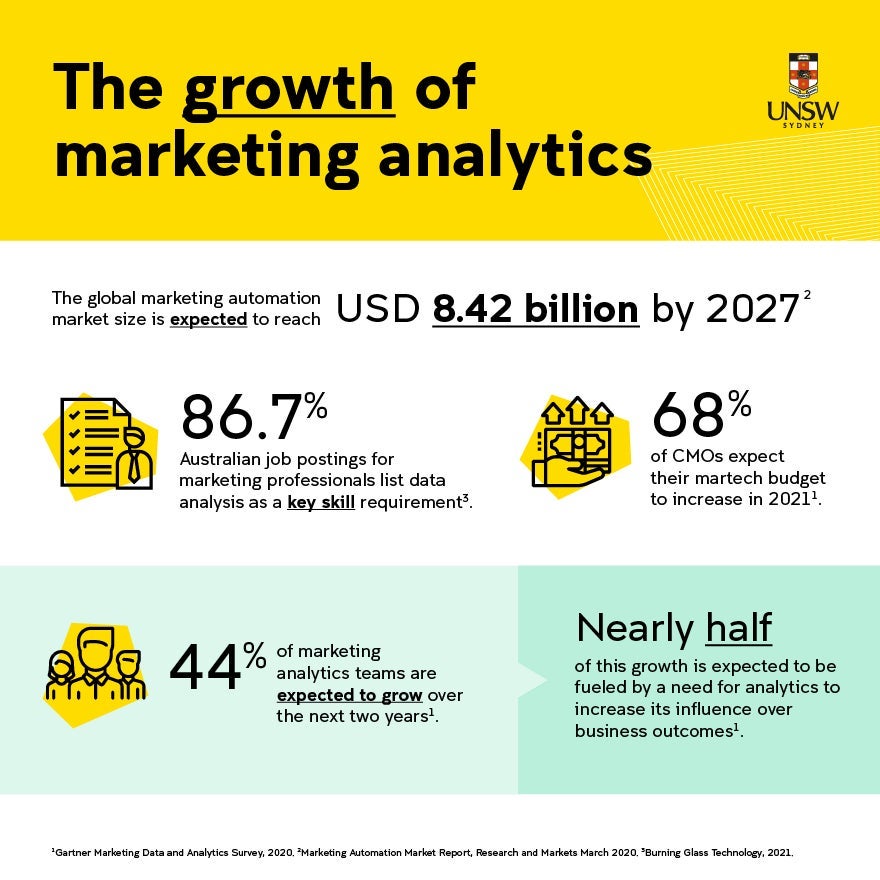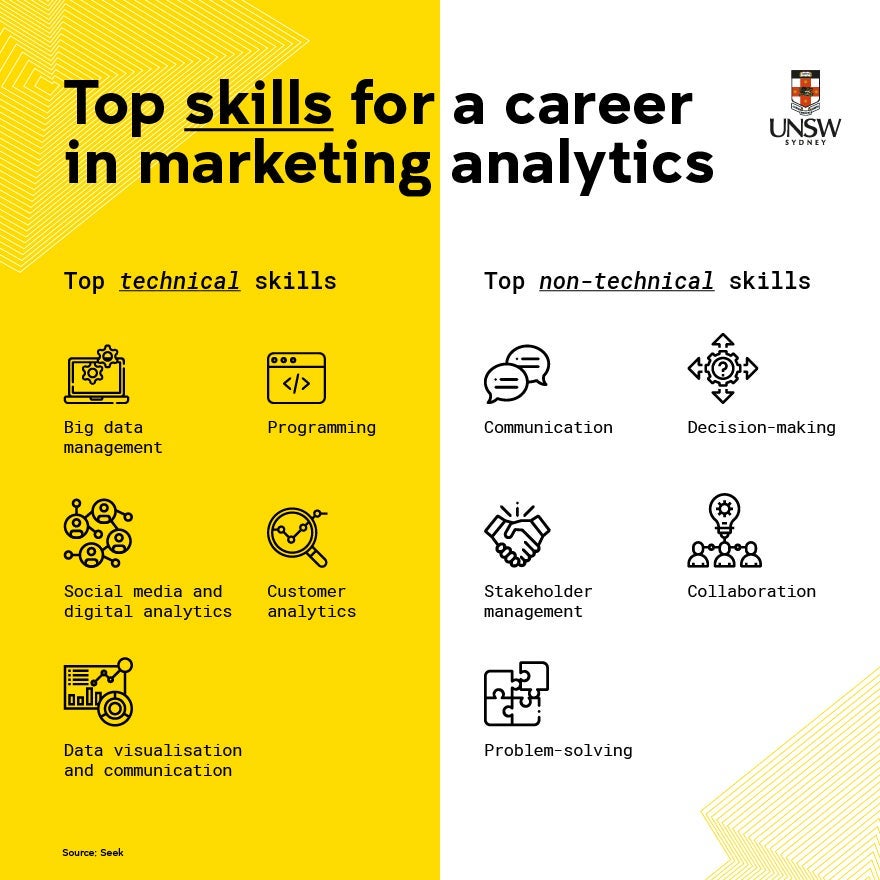While the coronavirus pandemic appeared to bring all that we know and love to a grinding halt, it had the opposite effect on data collection. As more and more of us pivoted to online solutions for our groceries, healthcare and education, data science went into overdrive.
Everything you need to know for the future of marketing analytics
While the coronavirus pandemic appeared to bring all that we know and love to a grinding halt, it had the opposite effect on data collection. As more and more of us pivoted to online solutions for our groceries, healthcare and education, data science went into overdrive.
Nobody knows that better than Amazon.
After years of focussing on marketing analytics and customer experience, Amazon’s profits doubled in the first quarter of the pandemic after sales rose 40 per cent.
“Many of the shifts we see today are likely here to stay,” confirms Professor Jack Cadeaux, Head of the School of Marketing at UNSW.
Those shifts include older generations becoming more comfortable with technology, all demographics doing more of their purchasing online and marketers getting access to more varied and useful big data.
More importantly, Dr Cadeaux confirms the benefits of marketing analytics are not exclusive to Amazon.
Success depends on marketers and business leaders having the skills to bring data analytics into critical business decisions.
“The availability of good marketing analytics means that marketing activities must demonstrate results and do so almost continuously.”
“In turn, a results-orientation means that marketing must use analytics. The two are inseparable,” declares Dr Cadeaux.
How marketing analytics has evolved
You only have to go back to the turn of the century to recall the early days of marketing analytics when marketing metrics largely consisted of point-of-sale information.
“However, much of that application took place in selected industries that generated very big data sets. Those included the supermarket industry, after the development of point-of-sale scanners, and the direct marketing industry,” explains Dr Cadeaux.
Another early source of marketing data was what we now know as subscription services, such as landline phone services, bank accounts and utility providers. Although they weren’t nuanced, the data sets were large and enabled optimisation of the marketing mix.
“Marketing analytics is not entirely new but has been present for many years in the toolkit used by the most sophisticated marketing managers and marketing researchers. Many of the tools currently used and being developed have a long history of testing and application,” reveals Dr Cadeaux.
Marketing analytics tools have improved
Martech tools such as Google Analytics, Adobe Analytics, Salesforce Marketing Cloud and Hubspot have evolved dramatically over the years to incorporate additional digital channels and the internet of things. A number of additional marketing analytics tools are now implementing artificial intelligence and machine learning.
“As online promotions and transactions have proliferated and data set interlinks evolved, the availability of massive, dynamic and interactive data sets in many forms has opened an almost limitless frontier for marketing analytics to support decision making,” exclaims Dr Cadeaux.
“This is often on a real-time and continuous basis, often evolving into artificial intelligence-based management that’s supported by machine learning algorithms,” he adds.
All businesses now have greater access to data
Chris Rozic is the CEO and Co-Founder of Datisan, an organisation that builds marketing analytics solutions for businesses. Mr Rozic specialises in applying automation, machine learning and artificial intelligence in marketing.
“This can be in the way a search ad is worded, to the bid price for an ad group, to what creative is shown in your social ads based on the machine learning of user engagement,” explains Mr Rozic.
At this level, marketing analytics allows you to customise the customer experience down to the individual user. But this isn’t set-and-forget e-commerce that runs on algorithms.
“Without a sound understanding of marketing analytics, it’s challenging to be able to provide human oversight to digital performance marketing to ensure that advertising is working the way you want it to, and to know when there is a change that needs to be made.”
“With the rise of cloud computing, speed of access to our data is like never before. It makes the analysis faster and the responsible, effective use of this information more important than ever to marketers,” confirms Mr Rozic.
With the future of marketing analytics on our doorstep, Dr Cadeaux agrees that skills in marketing analytics are essential for all marketers and in high demand from employers.
“The current analytics-based marketing era was foreseen many years ago, but is now the reality and has permeated marketing operations of all sizes, from those at the smallest non-profit to the largest powerhouses such as Amazon or Netflix,” confirms Dr Cadeaux.
What are the essential data analytics skills for marketers?
Chief Marketing Officers (CMOs) and businesses in general are looking for marketers with data analytics skills that will make a positive impact on their marketing efforts. To make a difference to the bottom line, you'll need to know customer analytics, social media and marketing analytics along with a healthy dose of real-world experience.
Customer experience vs customer analytics
In 1997, Jeff Bezos had a feeling that Amazon could be selling more than just books, CDs and DVDs, so he asked his customers what they think. Amazon selected 1000 customers to find out what they’d like to buy online.
Market research and customer analytics have come a long way since then, but the main purpose of customer data is still to build relationships with consumers.
“Data collection and analysis, particularly in the volumes enabled by the internet, provide great insight into customer lives and preferences,” details Mr Rozic.
Rather than just observing consumer behaviour, marketers must be able to apply customer analytics in a way that enhances and enriches the customer experience.
“Datisan has seen an increased expectation for businesses to be digitally-led and customer-centric in their marketing approach.”
Social media and digital marketing
A TikTok video of a man drinking cranberry juice while skateboarding to work and singing a Fleetwood Mac song was the social media viral hit of 2020. It turned out to be the most successful advertisement for Ocean Spray in its 90-year history.
Unfortunately, no matter how you cut the marketing attribution, Ocean Spray had nothing to do with the user generated content.
In fact, it’s unlikely that Ocean Spray would have created a video like that because the skateboarder wasn’t the target audience, wasn’t clearly displaying the product or logo, wasn’t wearing a helmet and drank straight from the bottle. All of these elements would have been considered off brand.
Analysis of social media and digital data can help marketers develop a more nuanced understanding of their consumers. Ocean Spray may have observed the overlap of cranberry juice drinkers, skateboarders and Fleetwood Mac fans to include in its marketing strategies.
Modern marketers must have the ability to convert social media and digital data into marketing insights that will increase customer awareness and improve the customer lifecycle.
Foundations of marketing analytics
“Marketing performance depends on marketing analytics, not only for its measurement, but even more so, for its achievement. Target outcomes defined by analytics are essential for responsible and accountable marketing,” exclaims Dr Cadeaux.
Where once marketing analytics were brought in as an add-on to give marketing strategies a boost, now they are integrated into every stage of the marketing process.
“Analysis, planning and control have always been the key components of marketing management. Marketing analytics has moved beyond its old pre-decision ‘analysis’ role, but is now intrinsically part of marketing planning and marketing control.”
The foundations of marketing analytics are built on statistical tools and techniques. Marketers and business leaders must be able to apply these tools in different settings and interpret the results.
“Marketers increasingly must know how to select and use tools developed by others and often develop ones for their own operations,” explains Dr Cadeaux.
“All of these operational marketing innovations depend on data and analytics and, at the same time, create new data and a further need for marketing analytics.”
Real-world experience
Marketing analytics tools have made it easy and inexpensive to run A/B or split tests as part of marketing campaigns. That’s where you run two marketing activities that differ only by one single variable – such as image, text or title.
By running successive A/B tests you can refine the individual variables in your marketing strategy.
But what if you have something bigger in mind?
When you upgrade your marketing analytics skills, you’ll want to get some real-world experience before you put them into practice in your next marketing strategy. UNSW Online’s Master of Analytics with Marketing Specialisation provides a rare opportunity to take those skills for a test drive.
The Marketing Analytics Capstone puts you in the driver seat of a real-world marketing analytics scenario. It’s the safest and most supported way to take your knowledge from concepts to real-life solutions.
A digital marketing strategy to take your career to the next level
At its heart, marketing has always been a business practice that creates, communicates and delivers value to the customer. You can give yourself a competitive advantage over your marketing peers with a marketing analytics qualification that creates, communicates and delivers value to employers.
Just like businesses seeking marketing maturity, there’s only one thing holding you back – the first step.
“The most challenging step in progressing digital marketing maturity can often be just getting started. Understanding your path and the types of activity that will support your marketing analytics career growth requires ongoing commitment and reflection,” declares Mr Rozic.
You can take the right first step with UNSW’s 100% online Master of Analytics – a full data analytics postgraduate degree that offers a Marketing Specialisation. Before deep diving into marketing analytics this course gives you a well-rounded base in programming, data analysis, managing big data, data visualisation, predictive analytics and ethics.
In addition to tackling real-world marketing analytics challenges in the capstone, you’ll develop a deep understanding of the foundations of marketing analytics. Knowledge of these statistical tools and techniques is one of the key skills that employers are looking for in marketing analysts.
The Marketing Specialisation in UNSW’s Master of Analytics also arms you with analytic methods to convert social media and digital data into marketing insights. These are essential skills that will put you ahead of the cranberry juice wave, rather than jumping on board after it passes you by.
Most importantly, you’ll focus on managing customer analytics with the goal of building relationships with customers that are based on a deep understanding of customer behaviour. That may include asking 1000 customers for their opinion like Jeff Bezos in 1997, or delivering a personalised experience like Amazon in 2021 and beyond.
All you have to do to harness the future of marketing analytics is to take that first step.
“The nature of digital marketing and marketing analytics is iterative, so stand still at your peril,” warns Mr Rozic.
Delivered 100% online and accelerated, learn how to navigate data-rich environments and deliver innovative marketing solutions with UNSW’s 100% online Master of Analytics - Marketing Specialisation.






